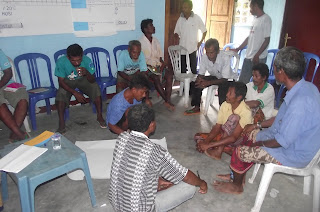Press Release
Period: May 2011
Edition: 01 June 2011
Between 24-26 May 2011 JSMP conducted monitoring of trials taking place at the Oecusse District Court. During the three days of court monitoring JSMP observed that hearings were slightly delayed or were not in accordance with the court schedule. However all of the cases scheduled for trial were heard by the court.
According to the court schedule, 11 cases were scheduled for trial and one of these cases had two hearings to examine witness testimony. From these 11 cases, 8 cases involved crimes or were categorized as domestic violence or violence against a spouse.
The trial of the aforementioned cases were presided over by single judge Alvaro Freitas, SH, the prosecution was represented in turn by Jacinto Babo, SH and Afonso Lopes SH, and the Public Defender’s Unit was represented by Calisto Tout, SH and in one case legal representation was provided by a lawyer from F-FSO
JSMP praises the efforts of the district court, because in just three days the court was able to use the available time to hear 12 cases, which means that four cases were heard each day. JSMP praises the district court for demonstrating its productivity to ensure that court administration is functioning effectively and therefore responding to public expectations on justice.
Whilst monitoring cases involving domestic violence, JSMP noted that the majority of victims and witnesses who were summoned by the court to provide testimony exercised their right to remain silent and refused to testify against a member of their family, pursuant to Article 125 of the Criminal Procedure Code.
The Executive Director of JSMP stated that although he welcomes the policy of the judges to fulfill their obligations in accordance with Article 125 of the Criminal Procedure Code to provide an option to the parties at the outset of the trial, however the judge or the court did not explain the implications or impact of this provision if everyone chooses to remain silent and refuses to give testimony against a defendant who has allegedly committed a crime against them.
He explained further that JSMP fully understands that the Criminal Procedure Code does not oblige the honorable judges to do so, however in reality JSMP believes that there is a need for the court to explain the i
mplications of Article 125 of Criminal Procedure Code to victims and witnesses who are summoned by the court, especially victims in cases categorized as gender based violence.
According to Article 125 of the Criminal Procedure Code regarding refusal to give a disposition:
1. The persons below may refuse to give a deposition as witnesses:
a). progenitors, siblings, descendants, relatives up to the second degree, adopters, adoptees, and the spouse of the defendant, spouse is a party:
b). a person who has been married to the defendant or who cohabits, or has cohabited, with the latter in a relationship similar to that of spouses, in relation to facts that have occurred during marriage or cohabitation.
2. The authority competent to take the deposition shall, under penalty of nullity, advise the persons referred to in sub article 125.1 that they are allowed to refuse to give a deposition.
JSMP agrees that the court has the responsibility of announcing Article 125 before the trial begins, because otherwise the trial can be declared null and void, however JSMP encourages the honorable judges of the court to consider the current reality and explain the effects of the article to victims and witnesses so that justice can prevail. In addition, the court must also consider Article 118 of the Criminal Procedure Code on the general provisions that relate to victim testimony to establish the truth in cases that have been submitted to the judicial authorities.
Previously, in December 2009, JSMP and Fokupers launched a report on the provisions of Article 125 of the Criminal Procedure Code as part of the “16 day campaign to end violence against women.”
JSMP has noted on several occasions whilst conducting court monitoring that in the nearly all cases involving domestic violence the victim is the sole witness. Therefore, if the parties choose to remain silent or refuse to give testimony, how can the court reveal the facts and obtain sufficient evidence to uphold justice in the interests of the victim?
JSMP believes that most victims choose to remain silent or not to give testimony to the court, not because they have a clear understanding of Article 125 of the Criminal Procedure Code, but because psychologically they have been placed in a difficult position of testifying against a family member who has committed violence against them, or they can choose to remain silent. The provisions of Article 125 of the Criminal Procedure Code place witnesses in a very difficult position.
During the aforementioned three days of observation the Oecusse District Court conducted hearings in 11 cases involving ordinary crimes. 8 of these cases related to domestic violence, and 4 of these were cases involving women as the perpetrators of domestic violence. This shows the public that it is not always men who commit domestic violence, but women also have the capacity to do so. This also means that Law No. 7/2010 Against Domestic Violence which came into force in July 2010 is not only intended to punish men, but this law will also be applied against any person who commits domestic violence against a member of their family, including female perpetrators
JSMP hopes that in the future the courts can learn from these experiences and will try to interpret the provisions of Article 125 of the Criminal Procedure Code in a context that prioritizes the interests of justice rather than being bound by rules that have the potential to promote injustice for vulnerable groups in society.
For more information, please contact:
Luis de Oliveira Sampaio
Executive Director of JSMP
Email: luis@jsmp.minihub.org
Telephone: 3323883/7295795




